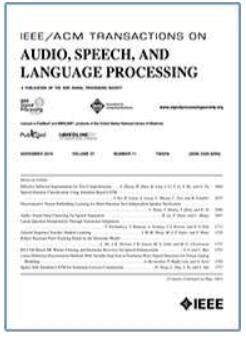ELP-Adapters: Parameter Efficient Adapter Tuning for Various Speech Processing Tasks
IF 5.1
2区 计算机科学
Q1 ACOUSTICS
IEEE/ACM Transactions on Audio, Speech, and Language Processing
Pub Date : 2024-07-26
DOI:10.1109/TASLP.2024.3434445
引用次数: 0
Abstract
Self-supervised learning has emerged as a key approach for learning generic representations from speech data. Despite promising results in downstream tasks such as speech recognition, speaker verification, and emotion recognition, a significant number of parameters is required, which makes fine-tuning for each task memory-inefficient. To address this limitation, we introduce ELP-adapter tuning, a novel method for parameter-efficient fine-tuning using three types of adapter, namely encoder adapters (E-adapters), layer adapters (L-adapters), and a prompt adapter (P-adapter). The E-adapters are integrated into transformer-based encoder layers and help to learn fine-grained speech representations that are effective for speech recognition. The L-adapters create paths from each encoder layer to the downstream head and help to extract non-linguistic features from lower encoder layers that are effective for speaker verification and emotion recognition. The P-adapter appends pseudo features to CNN features to further improve effectiveness and efficiency. With these adapters, models can be quickly adapted to various speech processing tasks. Our evaluation across four downstream tasks using five backbone models demonstrated the effectiveness of the proposed method. With the WavLM backbone, its performance was comparable to or better than that of full fine-tuning on all tasks while requiring 90% fewer learnable parameters.ELP 适配器:针对各种语音处理任务的参数高效适配器调整
自监督学习已成为从语音数据中学习通用表征的关键方法。尽管在语音识别、说话人验证和情感识别等下游任务中取得了可喜的成果,但仍需要大量参数,这使得针对每项任务的微调记忆效率低下。为了解决这一限制,我们引入了 ELP 适配器调整,这是一种利用三种适配器(即编码器适配器(E-adapters)、层适配器(L-adapters)和提示适配器(P-adapters))进行参数高效微调的新方法。E 适配器集成到基于变压器的编码器层中,有助于学习对语音识别有效的细粒度语音表征。L 适配器创建了从每个编码器层到下游头的路径,有助于从较低的编码器层中提取非语言特征,从而有效地进行说话人验证和情感识别。P 适配器将伪特征附加到 CNN 特征中,以进一步提高效果和效率。有了这些适配器,模型可以快速适应各种语音处理任务。我们使用五个骨干模型对四个下游任务进行了评估,结果证明了所提方法的有效性。使用 WavLM 骨干模型,它在所有任务中的性能都与完全微调相当或更好,而所需的可学习参数却减少了 90%。
本文章由计算机程序翻译,如有差异,请以英文原文为准。
求助全文
约1分钟内获得全文
求助全文
来源期刊

IEEE/ACM Transactions on Audio, Speech, and Language Processing
ACOUSTICS-ENGINEERING, ELECTRICAL & ELECTRONIC
CiteScore
11.30
自引率
11.10%
发文量
217
期刊介绍:
The IEEE/ACM Transactions on Audio, Speech, and Language Processing covers audio, speech and language processing and the sciences that support them. In audio processing: transducers, room acoustics, active sound control, human audition, analysis/synthesis/coding of music, and consumer audio. In speech processing: areas such as speech analysis, synthesis, coding, speech and speaker recognition, speech production and perception, and speech enhancement. In language processing: speech and text analysis, understanding, generation, dialog management, translation, summarization, question answering and document indexing and retrieval, as well as general language modeling.
 求助内容:
求助内容: 应助结果提醒方式:
应助结果提醒方式:


